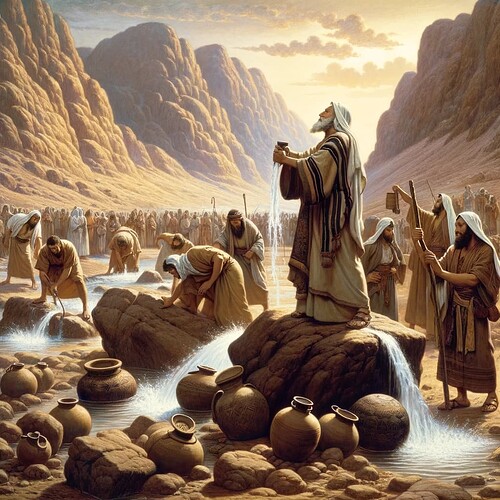 February 9: Exodus 17, 18: Through Struggles and Wisdom
February 9: Exodus 17, 18: Through Struggles and Wisdom
 Introduction
Introduction
In today’s reading, we witness how God, through Moses, continually caters to the needs of the Israelites amidst their journey. We also see the importance of wise counsel as exemplified by Jethro, Moses’ father-in-law.
 The Battle at Rephidim, and Provision at Massah and Meribah
The Battle at Rephidim, and Provision at Massah and Meribah
In their desert journey, the Israelites were faced with the lack of water and feared for their lives. Despite their doubts, God provided for their needs once again through Moses, striking a rock in Horeb for water to flow.
![]() Key Verse: “And Moses cried unto the Lord, saying, What am I to do with these people? They are ready to stone me.” (Exodus 17:4)
Key Verse: “And Moses cried unto the Lord, saying, What am I to do with these people? They are ready to stone me.” (Exodus 17:4)
 Victory Over Amalek
Victory Over Amalek
The first instance of an actual battle in Exodus: Moses realized that Israel’s victory was dependent on his upheld hands praying to God.
![]() Key Verse: “As long as Moses held up his hands, the Israelites were winning, but whenever he lowered his hands, the Amalekites were winning.” (Exodus 17:11)
Key Verse: “As long as Moses held up his hands, the Israelites were winning, but whenever he lowered his hands, the Amalekites were winning.” (Exodus 17:11)
 Jethro’s Wise Counsel
Jethro’s Wise Counsel
Recognizing the demanding load on Moses, Jethro wisely advised him to delegate responsibilities. This effectively decentralized power, allowing matters to be handled more efficiently.
![]() Key Verse: "Listen now to my words… select capable men from all the people—men who fear God, trustworthy men who hate dishonest gain—and appoint them as officials…” (Exodus 18:19-21)
Key Verse: "Listen now to my words… select capable men from all the people—men who fear God, trustworthy men who hate dishonest gain—and appoint them as officials…” (Exodus 18:19-21)
 Key Themes and Reflections
Key Themes and Reflections
In these chapters, the themes of God’s provision, our dependence on Him, and the importance of wisdom and counsel from others ring clear.
![]() Provision From God: Despite the Israelites’ gripes and doubts, God continues to provide for their needs. Like them, we may falter in faith, but can rest assured that God is always there for us.
Provision From God: Despite the Israelites’ gripes and doubts, God continues to provide for their needs. Like them, we may falter in faith, but can rest assured that God is always there for us.
![]() Dependence: Just as Moses realized the battle was won only when his hands were uplifted towards God, we too must keep our focus on God for victory in life.
Dependence: Just as Moses realized the battle was won only when his hands were uplifted towards God, we too must keep our focus on God for victory in life.
![]() Wisdom and Counsel: Moses didn’t ignore Jethro’s advice. Instead, he utilized it for better leadership. As we navigate life, we stand to benefit from the wise advice of others.
Wisdom and Counsel: Moses didn’t ignore Jethro’s advice. Instead, he utilized it for better leadership. As we navigate life, we stand to benefit from the wise advice of others.
 Today’s Application
Today’s Application
We should learn to rely on God always, seeking His guidance through prayer as we make decisions. Furthermore, we can benefit from listening and applying wise advice from others in various aspects of our lives.
 Hidden Gem
Hidden Gem
The “rod of God” that Moses held aloft during the battle against Amalek is the first mention of prayerful intercession in the Bible.
 Reflective Q&A:
Reflective Q&A:
![]() Provision at Massah and Meribah: Why did God choose to provide water in such a manner?
Provision at Massah and Meribah: Why did God choose to provide water in such a manner?
A: God’s provision goes beyond our limits of understanding, teaching us to trust Him fully.
![]() Why did Moses’ hands have to be kept raised for Israel’s victory?
Why did Moses’ hands have to be kept raised for Israel’s victory?
A: This reflects our dependence on God, teaching us the importance of constant prayer and trust in God.
![]() How does Jethro’s advice apply to our lives today?
How does Jethro’s advice apply to our lives today?
A: It illustrates the importance of listening to trusted counsel and the wisdom of delegation.
 Join the Discussion
Join the Discussion
How do these chapters resonate with your experiences or struggles? How have you experienced God’s provision in your life?
![]() See You Tomorrow in Exodus 19, 20:
See You Tomorrow in Exodus 19, 20:
Prepare for the crucial moment of Israel’s history – receiving divine laws on Mount Sinai. Join us as we journey deeper into Exodus. May these readings enrich your understanding of God’s word, encouraging us to continually depend on Him, stay open to wise counsel, and experience His unfailing provision.
